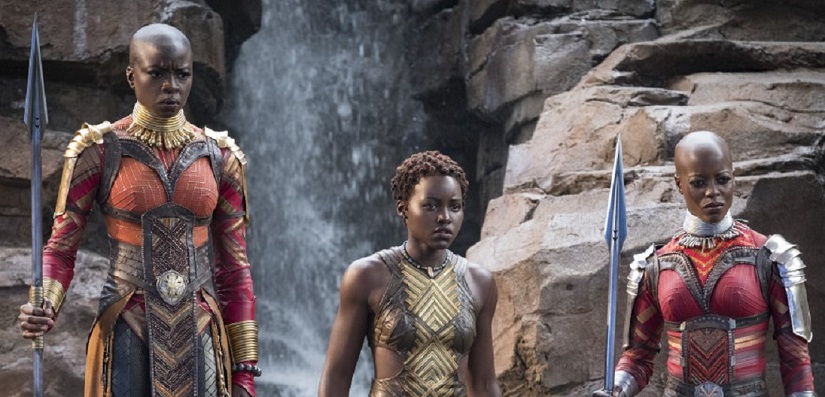
Because the imaginary of black women (and black people in general) is so limited in the media, every image takes on a crucial importance and is forced to be taken a lot more seriously than entertainment ever should be. Black Panther is one of the first movies of its kind, scale and reach to feature all black women. The entire movie was filled mostly with black people except for two white men who played minor roles, and a few scenes that took place in America. The fictional African country of Wakanda is supposed to be a representation of black people free of the effects of slavery and colonization. This being the case, whiteness was not glorified, women wear their natural hair, head wraps or extension braids. Women, freed of Western gender stereotypes, also fight as soldiers.
This concept of women as soldiers is supposed to feel freeing and new. Women, especially in superhero and Disney movies are often portrayed as damsels in distress waiting to be saved by the superhero (Superman) or the love interest who inspires the superhero to do good (Batman). And thus women who defend themselves and their land while still being love interests who maintain the protection of their men (when necessary), is refreshing.
Except for the fact that the women of Wakanda are black women, and thus their portrayal cannot be seen as a direct response to the over-saturation of damsels in distress and love interests. While white women have been portrayed as damsels in distress in movie after movie —Cinderella, Rapunzel, Snow White, etc., black women have not. While white women may be correct in desiring a new portrayal of themselves —Wonder Woman, Elsa of Frozen. The representation of black women as strong, independent and tough, already exists and is in fact oversaturated in the media. Again, because the images of black people are so limited in the media, every representation of us takes on more importance than any piece of media should. And because our interactions with white people (or rather, their interactions with us —especially when they are in authoritative roles) are so limited, how we are represented in media matters in some ways —especially in interactions with them, even more than face to face interactions.
Two real-life images come to mind, one, a police officer sitting on the back of a young black woman while arresting her —why did no one come to her rescue? Why didn’t anyone save her? Why was she manhandled? Maybe because she’s seen as a “strong black woman” who “don’t need no man” to help her, as stereotypes often dictate. The second, a young black woman pinned to the floor in her classroom simply because she was doing what teenagers do, not listening. Yet the school security guard approached her as if she was King Kong. Again, —why did no one come to her rescue? Why didn’t anyone save her? Why was she manhandled? Even when black women need male help we don’t get the privilege of being treated like damsels in distress.
Black women, especially dark skin black women with strong African phenotypes, have been treated throughout their lives as if they are as strong as men, and not in need of their protection. The portrayal of the women in Black Panther, unfortunately, adds to that.
Yet, despite them playing into the “strong black woman” trope, what they did beautifully and what we need more of, is to showcase interdependence over independence. Black women may have been strong but they worked with men (and in the service of a King) to defend their land and their people. There were also praiseworthy showcases of love, honor, and respect between black women and men.
To be clear, one movie representing black women as strong warriors capable of defending themselves isn’t problematic, it’s the repetition of this already existent stereotype that is. We as black women don’t have a slew of movies (or media of any kind) where black men protect us, rescue us or look to us for inspiration. In fact, too many black women already feel that they cannot depend on black men and must indeed become a warrior to face the world on their own. So while the female soldiers in Black Panther may seem like a feminist fantasy, too many black women already know what its like to be front and center on the battlefield of life, and for those women, the fantasy would be a rest from fighting and the safeguard of strong male leadership.





Recent Comments